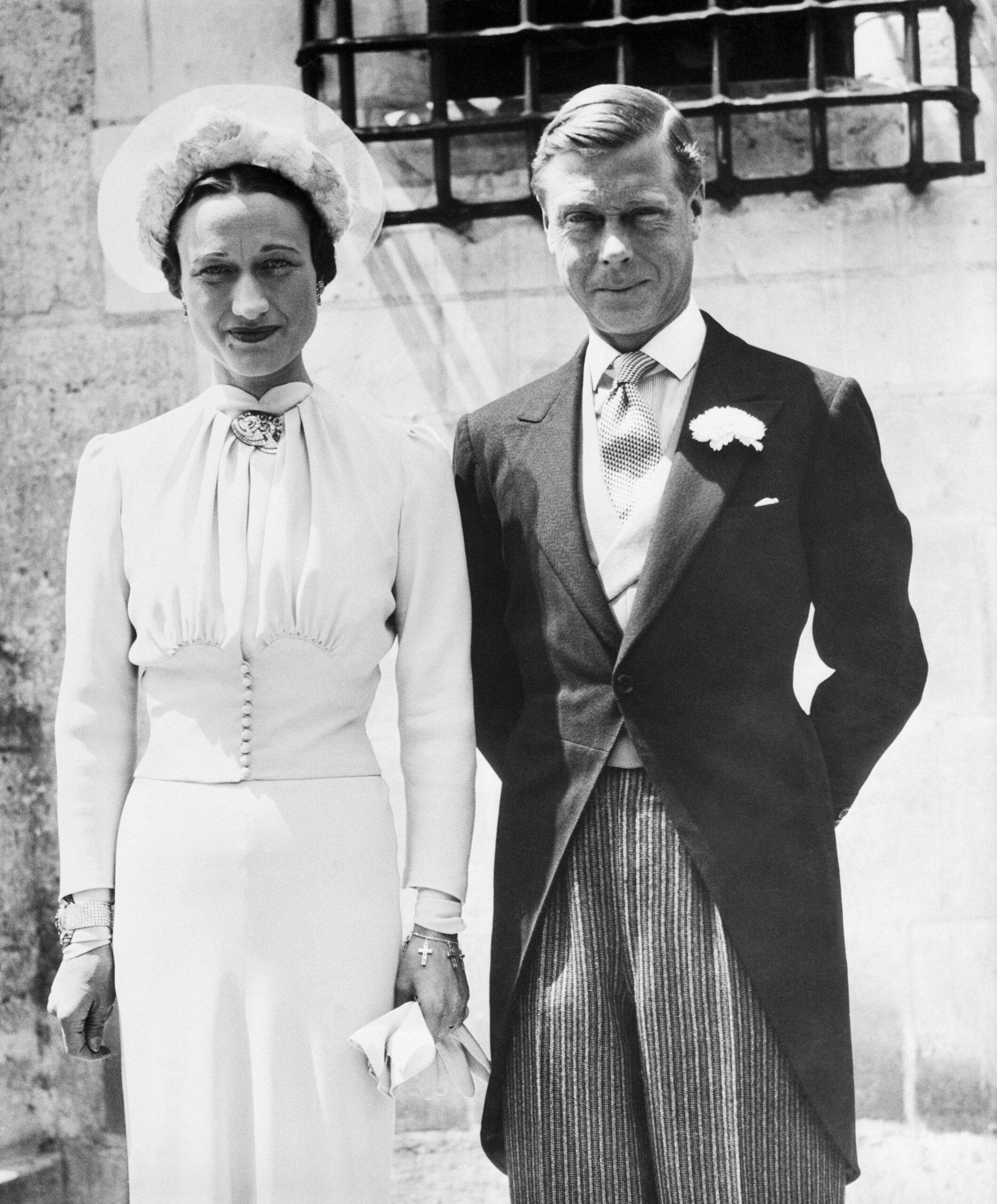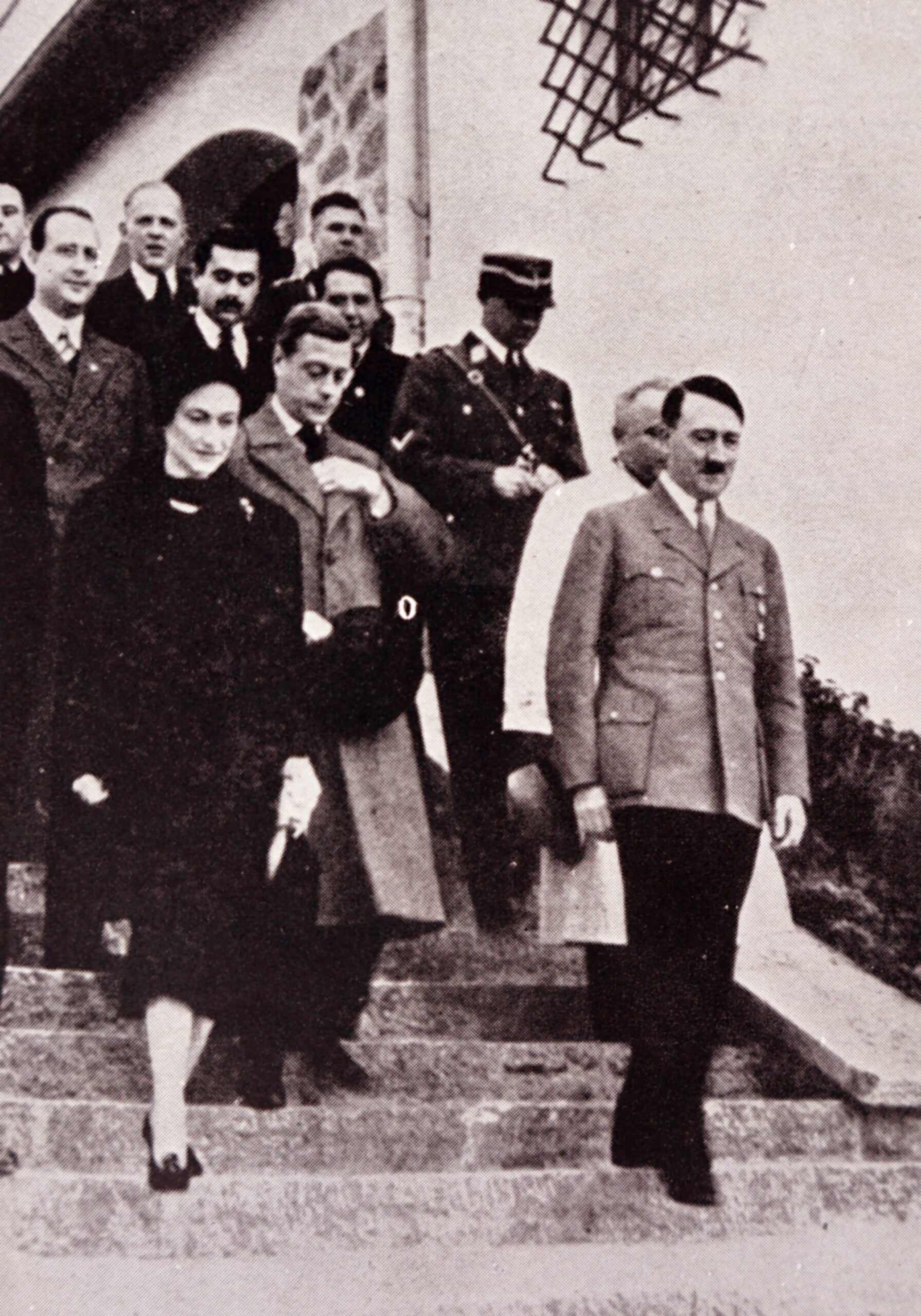According to a royal expert, the late Prince Philip had a rather pointed nickname for the Duchess of Sussex, and it wasn’t so kind.
The nickname suggested a comparison to Wallis Simpson, the controversial wife of the former King Edward VIII, drawing parallels between Meghan Markle and Wallis, both American and divorced when they married into the royal family.
Prince Philip supposedly referred to Meghan with a name that made reference to this connection.
Wallis Simpson and King Edward VIII
Wallis Simpson, an American divorcée who became the Duchess of Windsor, was one of the most controversial royal figures in recent history after King Edward VIII decided to abdicate the throne in December 1936 (after less than a year as a monarch) to be able to marry her.

At the time, royals were prohibited from entering into a marriage with a divorced person – a rule that did not change until 2002, just three years before the then-Prince Charles married Camilla, per the Royal Observer.
Following King Edward and Wallis Simpson’s marriage, they were not allowed to return home without the permission of his brother, the new King George VI, as there were fears it could potentially cause public unrest, Vogue detailed.
During their years of exile, the Duke and Duchess of Windsor constantly attracted headlines – with one of their most shocking incidents occurring in 1937 when they visited Nazi Germany and were photographed giving the notorious Nazi salute upon meeting Adolf Hitler.

Prince Philip’s brutal nickname
Royal biographer Ingrid Seward shed light on Prince Philip’s perspective during an interview with GB News, suggesting that he thought Meghan and Wallis Simpson had many similarities, leading to the adoption of a discreet nickname for the Duchess of Sussex.
Allegedly Prince Philip, who Seward says was known for his astute judgment of character, couldn’t overlook the resemblances between Meghan and Prince Harry and Edward and Mrs. Simpson.

“I think that Prince Philip was very canny about people and he didn’t always see bad in people, he often tried to see the good in them,” Seward said.
“He just could not get away from the similarities between Meghan and Harry and Edward and Ms Simpson, which his why he used to call her the Duchess of Windsor. Not to her face though, he used to call her DOW,” she added.
In her book ‘My Mother and I‘, Seward delved further into Prince Philip’s reservations about Meghan, describing him as “wary” of the former Suits actress and her potential impact on the royal family.
While Prince Philip saw Meghan as potentially disruptive, Queen Elizabeth II held “high hopes” for her, indicating differing perspectives within the royal family regarding Meghan’s role and influence.

Prince Harry and Meghan Markle left royal life
Since stepping back from their royal duties in 2020 and relocating to California, Meghan and Harry have maintained a relatively low profile within the royal sphere.
While Harry is set to visit the UK for the 10th anniversary of the Invictus Games, with a service to be held at St. Paul’s Cathedral on May 8, according to the Daily Express. Meghan is expected to remain in the US, citing safety concerns and a desire to avoid stirring up controversy.
Despite occasional returns to the UK for significant events like Queen Elizabeth II’s funeral in 2022, Meghan has opted out of attending others, such as King Charles III’s coronation, which Harry attended alone last year.
It’s clear that Meghan is choosing to prioritizing her safety and peace amidst constant scrutiny and public interest in her relationship with the royal family.
What did you think of this story? Be sure to let us know in the comments!
Millionaire Shows Up at Fiancée’s Door Dressed as Homeless Man—What Happened Next Is Shocking
Richard Grey was a remarkable young man. Even though his parents were very rich, he stayed humble and kind. His caring nature helped him meet his fiancée. However, things didn’t turn out as expected when Richard decided to test her by pretending to be a homeless man at her door.
The Grey family was known for their wealth. Some people believed they were so rich they could buy all the houses in Beverly Hills. Their family’s wealth and status went back to the 1700s. Many family members came and went, but they kept their high position.
Richard was the only child of his parents, Franco and Leah Grey. The couple had waited many years to have him. As expected, they spent their fortune and effort raising Richard to be one of the finest gentlemen.
Richard Grey was a remarkable young man. Even though his parents were very rich, he stayed humble and kind. His caring nature helped him meet his fiancée. However, things didn’t turn out as expected when Richard decided to test her by pretending to be a homeless man at her door.
The Grey family was known for their wealth. Some people believed they were so rich they could buy all the houses in Beverly Hills. Their family’s wealth and status went back to the 1700s. Many family members came and went, but they kept their high position.
Richard was the only child of his parents, Franco and Leah Grey. The couple had waited many years to have him. As expected, they spent their fortune and effort raising Richard to be one of the finest gentlemen.

He made people happy, and his parents were proud of their perfect son. They were excited that one day he would manage their family estate. But they were also worried about his future.
Franco and Leah wanted grandchildren. Leah especially wanted Richard to find a wife and have kids. She would call future grandchildren her “tiny soldiers” and couldn’t wait to see them.
Leah once challenged Franco, who asked her to stop pressuring their son. “You might die before me, Franco, and you don’t care that you might never see his baby?” she asked.
Franco calmly replied, “I want grandkids too, but he needs time. Finding love isn’t easy these days.”
Leah was not convinced. “People get married every day, Franco! He hasn’t even started thinking about it,” she said.
Franco’s words didn’t stop Leah from bringing up the subject with Richie every time she saw him. He would say, “Mom, I’m trying to find the right girl. It’s hard to know who loves you for real.”
Richard was right. His wealth made it difficult to find a genuine woman. He wanted someone committed, compassionate, and not interested in his money. He didn’t want a one-sided relationship.

While Richard had high standards for a partner, he was also willing to improve himself for the right woman. He dreamed of finding his Cinderella, the one who would make his heart race.
No one knew when it would happen, not even Richard. But soon enough, he met Marlene, a beautiful woman with a model-like figure. Richard was captivated by her looks and intelligence.
Richard worked hard to win Marlene’s heart. She wasn’t easily impressed, but eventually, he swept her off her feet. At least, that’s how she described falling in love with him.
After dating for a few months, Richard proposed with a grand gesture, and Marlene said yes. She proudly wore a large engagement ring, and they moved in together.
Richard supported Marlene, who claimed to raise money for orphanages. This warmed his heart, and he believed she was perfect for him.
He even sponsored her fundraising efforts and introduced her to his wealthy friends. But their love story took a turn when Richard decided to test Marlene.
One day, while organizing his garage, Richard saw Marlene rudely turn away an old homeless man who knocked on their door. She treated him harshly, which shocked Richard.
Later, Richard called the orphanage Marlene said she helped. To his surprise, they had never heard of her.
Richard hired a private investigator named Sarah. He wanted to know more about Marlene before marrying her. What he found out was disappointing, but he wasn’t ready to give up.
Sarah discovered that Marlene was a scam artist. She raised money under false pretenses and never helped any charity. She was only interested in herself.
Still, Richard decided to test her again. He disguised himself as a beggar, wearing heavy makeup to hide his identity.

When Marlene saw the disguised Richard at the door, she angrily yelled at him to leave, calling him disgusting and refusing to give him food or water.
https://googleads.g.doubleclick.net/pagead/ads?gdpr=0&us_privacy=1—&gpp_sid=-1&client=ca-pub-1773658762833587&output=html&h=280&adk=1580659534&adf=3121515258&w=622&abgtt=7&fwrn=4&fwrnh=100&lmt=1728914914&num_ads=1&rafmt=1&armr=3&sem=mc&pwprc=1191565633&ad_type=text_image&format=622×280&url=https%3A%2F%2Fjokesdaddy.com%2Fmillionaire-shows-up-at-fiancees-door-dressed-as-homeless-man-what-happened-next-is-shocking%2F%3Ffbclid%3DIwY2xjawF6A7tleHRuA2FlbQIxMAABHcP4f_KuLlLL9CvEctZ3pz3Qge2wzPewgQi0FYtf0bA1NK-_hNttBPGJhg_aem_xPJ3GluYJ7w3LtYKJcTC5A&host=ca-host-pub-2644536267352236&fwr=0&pra=3&rh=156&rw=622&rpe=1&resp_fmts=3&wgl=1&fa=27&uach=WyJXaW5kb3dzIiwiNy4wLjAiLCJ4ODYiLCIiLCIxMjkuMC42NjY4LjkwIixudWxsLDAsbnVsbCwiNjQiLFtbIkdvb2dsZSBDaHJvbWUiLCIxMjkuMC42NjY4LjkwIl0sWyJOb3Q9QT9CcmFuZCIsIjguMC4wLjAiXSxbIkNocm9taXVtIiwiMTI5LjAuNjY2OC45MCJdXSwwXQ..&dt=1728914538331&bpp=1&bdt=1646&idt=2&shv=r20241009&mjsv=m202410090101&ptt=9&saldr=aa&abxe=1&cookie=ID%3D7b20416647364f5b%3AT%3D1726322449%3ART%3D1728914541%3AS%3DALNI_MZpLszTnzQ9UIpvri7rf-Nvkymgqw&gpic=UID%3D00000f01a4fcfdfa%3AT%3D1726322449%3ART%3D1728914541%3AS%3DALNI_MbY7lAlwLY5uk2o_yrVgm9rCAdHOg&eo_id_str=ID%3D3eab1fc17d3c657c%3AT%3D1726322449%3ART%3D1728914541%3AS%3DAA-AfjZ-y03aOjnfgIilO4F5CCmp&prev_fmts=0x0%2C980x280%2C1479x808%2C622x280%2C622x280%2C1005x124%2C622x280%2C622x280&nras=9&correlator=6757256915152&frm=20&pv=1&u_tz=420&u_his=3&u_h=768&u_w=1360&u_ah=728&u_aw=1360&u_cd=24&u_sd=0.667&dmc=8&adx=270&ady=4632&biw=1479&bih=808&scr_x=0&scr_y=1500&eid=44759875%2C44759926%2C44759837%2C42533203%2C31087890%2C31087942%2C31087987%2C44795922%2C95343454%2C95344522%2C95344777%2C31088018%2C31087608&oid=2&psts=AOrYGsnwWw5LtDeHIg0sS5F3r9wk6OPGTX8jqeZiyoY37NKVMX5i2SniT5JgtFSAESDUmi3wcwm13zLGsUvVmUliq-vougudjSCT6wwCQnuvAuuOQq9LvA%2CAOrYGskspfQ58_vYlJskeXm7EgYaIKEYbRWwYNycCTmXYHTiGdFFl3UP0nZksKMd2iMdWFKjFtdvNW4DX9dohiQ0jV1TNuqm%2CAOrYGslLJ5sXornA61WhUsqd9wSS21U89AYzOwMSZDNFOw6QRL3AbwBRpJaF0wPVX2uIJlw1qDFkyLEHVtkIH1pE5A_sdkeW&pvsid=4017306384287314&tmod=678821459&uas=3&nvt=1&ref=https%3A%2F%2Fl.facebook.com%2F&fc=1408&brdim=131%2C23%2C131%2C23%2C1360%2C0%2C1019%2C668%2C1504%2C808&vis=1&rsz=%7C%7Cs%7C&abl=NS&fu=128&bc=31&bz=0.68&td=1&tdf=0&psd=W251bGwsbnVsbCxudWxsLDFd&nt=1&ifi=7&uci=a!7&btvi=6&fsb=1&dtd=M
A few days later, Richard returned in his disguise. But this time, he wiped off the makeup and confronted Marlene, revealing his true identity.
“I know all about you, Marlene. I’m guessing that’s not even your real name,” Richard said angrily.
Marlene was shocked and tried to explain. “I’m so sorry, Richard. It’s not what you think!” she stammered.
But Richard had heard enough. He grabbed her arm and told her to leave his house and his life.
Soon after, Marlene was arrested. A few months later, Richard started dating Sarah, the investigator. This time, he took things slowly and enjoyed the dating phase.
Leah, though a bit reluctant, finally stopped pressuring her son about marriage. But now, she would occasionally ask Sarah when she would propose to Richard.



Leave a Reply